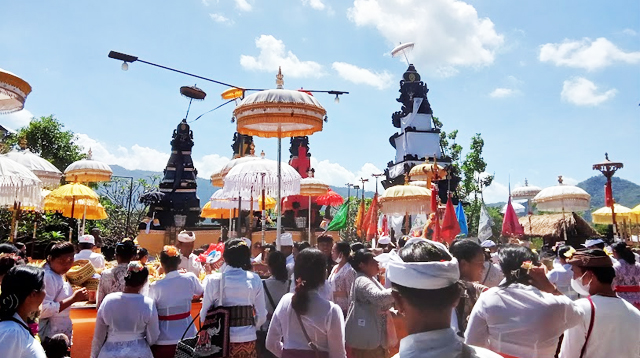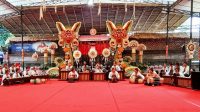- BALI’S temple festivals are a testament to the island’s unwavering connection to its cultural and spiritual heritage. These celebrations, with their vibrant rituals, profound meanings, and communal energy, provide a window into the soul of Bali. As the island continues to evolve, the temple festivals remain a cornerstone that bridges the past with the present, allowing locals and visitors alike to embrace the richness of Balinese culture and spirituality.
Bali, nicknamed as the “Island of the Gods,” is renowned for its vibrant culture, stunning landscapes, and deep spiritual traditions. At the heart of Balinese culture are the temple festivals, also known as “piodalan,” which are captivating celebrations that showcase the island’s rich heritage, devotion, and sense of community.
Definitely, these festivals offer a unique opportunity for both locals and visitors to witness the fusion of spirituality, art, and social connection.
A Tapestry of Tradition and Spirituality
Temple festivals hold immense significance in Balinese Hinduism, a unique blend of Hindu beliefs and indigenous traditions. Each village in Bali has several temples, each dedicated to different deities or aspects of life. These temples serve as spiritual centers for the community, and their festivals are held to honor the temple’s anniversary date or a specific deity.
Preparations for temple festivals are a communal effort that brings the entire village together. Months before the event, villagers collaborate to clean, repair, and decorate the temple complex. Lavish offerings of fruits, flowers, incense, and other symbolic items are meticulously prepared to be presented to the deities as a sign of devotion and gratitude.
When the festival day arrives, the temple grounds come alive with vibrant colors, music, dance, and intricate rituals. Balinese men, women, and children dress in customary attire (dominated by white and yellow) and gather at the temple, creating a breathtaking tableau of culture and spirituality. Ceremonial dances, such as the Barong and Pendet, are performed to depict ancient stories and myths, invoking blessings and protection.
Offerings and Offerings
Central to Balinese temple festivals are the offerings, or “canang sari,” which are artistic arrangements of flowers, leaves, and symbolic items placed in woven trays made of young coconut leaves. These offerings are offered to the deities as an expression of gratitude and devotion. They can be found not only at temples but also in homes, businesses, and public spaces, demonstrating the pervasiveness of spirituality in everyday life.
Bali’s temple festivals transcend religious and cultural boundaries, welcoming visitors to partake in the celebrations. The island’s warm hospitality extends to outsiders, who are often welcomed to observe and learn about the rituals and traditions. This inclusivity fosters cultural exchange and mutual understanding.
Beyond the religious and cultural significance, temple festivals serve as a cornerstone of community cohesion. These events strengthen the bonds among villagers and create a sense of unity and belonging. Shared meals, conversations, and the collective efforts put into organizing the festival foster a deep sense of camaraderie.
In an era of rapid globalization, Bali’s temple festivals remain steadfast as a reminder of the island’s cultural roots. While modernity has brought changes to the island, the Balinese people’s commitment to preserving their traditions and spiritual practices remains unshaken.
Experiencing a Temple Festival
For visitors to Bali, experiencing a temple festival can be a transformative and awe-inspiring encounter. Attending a festival offers a chance to witness the convergence of art, devotion, and community spirit in a way that few other experiences can match.
To attend the temple festival, kindly consult to your travel agent or tour guide in order not to disturb the procession. While at the same time, you get the best and most unique experience regarding Balinese culture.










